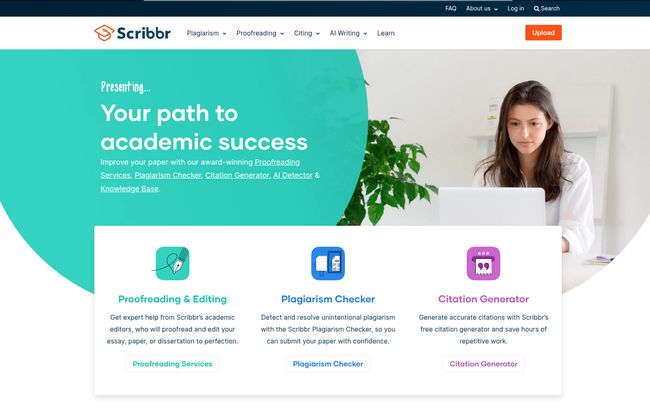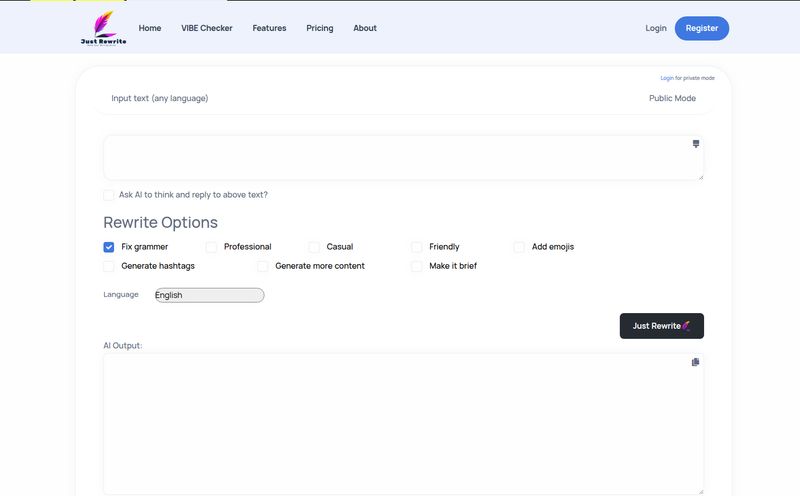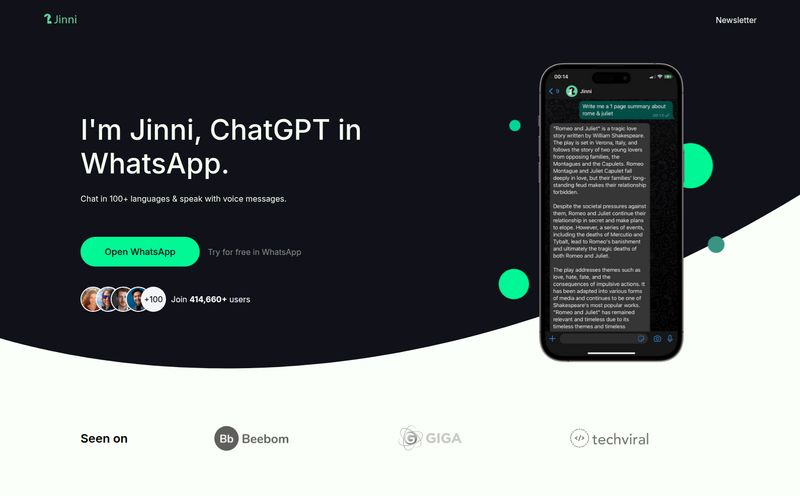It’s 2 AM. The coffee has turned to sludge, your document is a sea of blinking cursors, and you've just realized your reference list looks like a toddler’s shopping list. We’ve all been there. That pre-submission panic is a rite of passage for every student. For years, the only solution was more coffee and a prayer to the academic gods. But now, we have tools. Lots of them.
Today, I’m looking at one of the big names in the student support space: Scribbr. It promises to be your path to academic success, a one-stop-shop for everything from polishing your prose to dodging the dreaded plagiarism bullet. As someone who’s spent years wrangling content for SEO and staring at Google Docs until my eyes cross, I'm naturally curious—and a little skeptical. Can one platform really do it all?
And, funnily enough, when I went to their site to start this review, I was met with a Cloudflare screen that said, "Verifying you are human." Oh, the irony. In an age where we're all trying to sound more human and less like a robot, the robots are checking our credentials. Let’s see if Scribbr itself passes the human test.

Visit Scribbr
So What Exactly Is Scribbr? More Than a Spell Checker
First off, let's get one thing straight. Scribbr isn't just another grammar checker nagging you about a misplaced comma. It's positioned as an entire ecosystem for academic writing. Think of it less as a single tool and more like an academic Swiss Army knife. You’ve got a gadget for pretty much every stage of the writing process, from the first messy draft to the final, polished submission.
The platform is built on three core pillars that address the biggest pain points for students: professional proofreading, a plagiarism checker, and a citation generator. But as we'll see, it's expanded way beyond that, stepping boldly into the new world of AI-powered writing assistance.
The Core Features That Actually Matter
A platform is only as good as its features. So, let’s break down the main offerings and see if they live up to the hype.
Professional Proofreading and Editing by Real Humans
This is Scribbr's bread and butter, and frankly, it's what intrigued me most. While AI can catch a typo, it often misses the feel of a sentence. Scribbr boasts a "Dream Team" of academic editors—real people with expertise in various fields who will go through your paper. They check for grammar, spelling, and punctuation, but they also look at things like clarity, tone, and structure. This is the kind of feedback you can't get from an algorithm. I've always maintained that for truly important content, a human eye is irreplaceable. It’s the difference between a technically correct sentence and a sentence that actually sings.
The Plagiarism Checker Every Student Both Fears and Needs
Let's talk about the big P-word. Plagiarism. Nothing strikes more fear into a student's heart. Most of the time, it's not even intentional! It’s a forgotten citation, a poorly paraphrased sentence, or just a simple mistake made at 3 AM. Scribbr’s Plagiarism Checker is designed to be your safety net. It compares your document against a massive database of academic sources and web pages. What I like is that it doesn't just slap you with a percentage; it aims to help you understand and fix the potential issues, turning a moment of panic into a learning opportunity.
The Citation Generator That Saves Your Sanity
I have a confession. I still get a little twitchy thinking about formatting citations. APA, MLA, Chicago, Harvard... it's a mess of periods, commas, and italics that seems designed purely to test your patience. Scribbr's Citation Generator automates this entire soul-crushing process. You can generate citations for websites, books, and journals in various formats. For anyone who's ever lost points on a paper because of a formatting error in their bibliography, this tool is less of a feature and more of a public service.
Stepping into the AI Arena
Okay, here’s where things get really interesting. Scribbr hasn’t been sleeping on the AI revolution. They've integrated a full suite of AI tools, which is both impressive and, lets be honest, a little controversial in the academic world.
The AI Detector and Humanizer Conundrum
Scribbr offers an AI Detector to check if text was written by a model like ChatGPT. This is a direct response to universities cracking down on AI-generated submissions. But then, in a fascinating twist, they also offer an AI Humanizer. See the paradox? One tool to catch the robots, another to make your writing sound less robotic. Some might argue this skirts an ethical line. In my experience, these "humanizers" are often just sophisticated paraphrasers. They can help you rephrase clunky sentences, but they won't magically inject your unique voice into a piece of text. My take? Use it as a thesaurus on steroids, not as a way to pass off AI work as your own. Authenticity still wins.
Other AI-Powered Writing Assistants
Beyond the detector-humanizer duo, you also get a Paraphrasing Tool, a Summarizer, and an AI Proofreader. These are pretty standard fare in the AI writing world now. The paraphraser can help you avoid accidental plagiarism, and the summarizer is great for condensing long articles for research. They’re useful assistants, but they require a guiding human hand. They can help you build the car, but you still need to be the one driving it.
Beyond the Tools: The Secret Weapon in the Knowledge Base
This might be Scribbr's most underrated feature. They have an extensive Knowledge Base filled with articles, lecture slides, and video guides on how to write... well, anything academic. From structuring a thesis to understanding research methods, it’s a goldmine of information that they offer for free. In a world where everyone is trying to put good content behind a paywall, this is a seriously commendable move. It shows they're not just selling a product; they're invested in actually helping students learn.
What's The Catch? Pricing and Limitations
Alright, it can't all be sunshine and perfect citations. Let's talk about the downsides.
First, the price. While many of the AI tools and the Knowledge Base are free, the star of the show—the human proofreading and editing service—is not. Scribbr doesn't have a simple monthly subscription. Instead, it works on a quote-based system. The price for proofreading depends on your word count, the desired turnaround time (from 24 hours to 7 days), and the level of service you need. This makes sense for a service-based model, but it means you can't just try it out for $10. It’s an investment, and one that might be more suited for a final dissertation than a weekly discussion post.
The other limitation is inherent to all tools of this nature: they require good input. An editor can polish a paper, but they can't fix a weak argument or flawed research. The AI tools can rephrase a sentence, but they can't create an original thought. Scribbr is a powerful amplifier, but it cant create signal from noise.
My Final Verdict as a Content Pro
So, is Scribbr worth it? In my opinion, yes—but for the right person at the right time.
If you're a final-year undergrad, a Master's student, or a PhD candidate working on a major project, the professional editing service could be invaluable. It provides that final layer of polish and confidence before you hit 'submit.' For younger students, the free tools like the citation generator and the incredible Knowledge Base are fantastic resources that can genuinely improve your writing skills.
Compared to something like Grammarly Premium, which focuses solely on automated checks, Scribbr’s human element gives it a distinct edge for high-stakes academic work. It fills a gap between automated software and hiring an expensive freelance editor directly.
It's a comprehensive, well-thought-out platform that understands its audience. It won’t write your paper for you, and it shouldn’t. But it will hold your hand through the most tedious and terrifying parts of the process, and for any student, that's a pretty big deal.
Frequently Asked Questions About Scribbr
- Is Scribbr's plagiarism checker reliable?
- Yes, it's considered very reliable. It partners with Turnitin, the software used by many universities, to provide a comprehensive check against a vast database of academic and online sources.
- Can I use Scribbr for free?
- Many of Scribbr's tools are free to use, including the Citation Generator, a basic version of the grammar checker, and some of the AI tools. The comprehensive Knowledge Base is also free. However, the core Proofreading & Editing service and the advanced Plagiarism Checker are paid services.
- Is the human proofreading service worth the cost?
- It depends on your needs. For a critical document like a thesis, dissertation, or a paper that's a huge part of your grade, having a professional human editor can be extremely worthwhile. They catch nuances in tone and structure that AI often misses.
- What citation styles does Scribbr support?
- Scribbr's Citation Generator is quite robust, supporting thousands of styles, including the most common ones like APA (6th and 7th editions), MLA (8th and 9th editions), Chicago, Harvard, and Vancouver.
- How does the Scribbr AI Detector work?
- The AI Detector analyzes text for patterns commonly found in AI-generated content, such as perplexity (complexity) and burstiness (sentence structure variation). It then provides a probability score of how likely the text is to be AI-generated. It’s a helpful guide but, like all detectors, not 100% infallible.
- Is Scribbr just for students?
- While its primary audience is students and academics, the tools are useful for anyone doing serious writing. Researchers, business professionals writing reports, and authors could all benefit from the proofreading services and writing tools.
Wrapping It All Up
Navigating the pressures of academic writing is tough. Tools like Scribbr aim to make it a little less lonely. By combining the efficiency of AI with the irreplaceable nuance of human expertise, it’s carved out a powerful niche. It’s not a magic wand, but it’s a seriously powerful assistant that can help you submit work you’re truly proud of. And in the end, that's what it's all about, isn't it?



